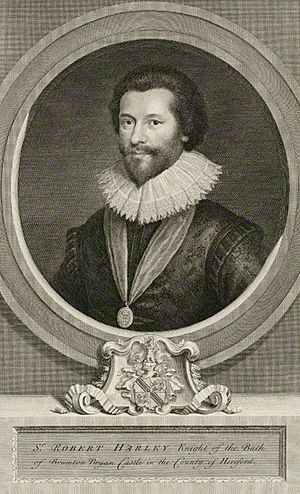Robert Harley (1579–1656) facts for kids
Sir Robert Harley was an important English politician who lived from 1579 to 1656. He worked for King Charles I as the Master of the Mint, which meant he was in charge of making all the coins for the country. Sir Robert was a very religious man, known as a Puritan. When the big conflict called the Wars of the Three Kingdoms (also known as the English Civil War) began, he chose to support Parliament against the King.
Contents
Life of Sir Robert Harley
Early Years and Education
Robert Harley was born in 1579. His father was Thomas Harley, and his family lived at Brampton Bryan Castle in Herefordshire, England. He went to Oriel College, Oxford University in 1595 and finished his studies in 1599. After that, he studied law at Middle Temple in London. In 1603, he was given the special title of Knight of the Bath.
Political Career and the Mint
After he got married in 1603, Sir Robert started working in local government in Herefordshire and Radnorshire. He was elected to Parliament several times. He represented different areas, including Radnor in 1604, Herefordshire in 1624 and 1626, and Evesham in 1628.
In 1623, he married Brilliana, whose father was a powerful government official named Sir Edward Conway. Sir Robert helped his father-in-law in Parliament. As a reward for his help, he was given the important job of Master of the Mint. This meant he was responsible for making all the coins in England. He lost this job for a short time in 1635 but got it back in 1643.
Religious Beliefs and Parliament
Sir Robert Harley was a very strict Puritan, just like his wife Brilliana. Puritans had strong religious beliefs and did not like some of the changes happening in the Church of England. Sir Robert was against the King's taxes, like "ship money," and also disagreed with some religious ideas of the time.
He was elected to Parliament again in 1640. He joined the group that opposed King Charles I. Sir Robert was put in charge of a special committee. This committee was responsible for removing religious statues and art from churches. Puritans believed these items were "superstition" and should not be in churches.
Role in the English Civil War
When the Wars of the Three Kingdoms (English Civil War) began, Sir Robert strongly supported Parliament. His family home, Brampton Bryan Castle, was attacked and surrounded by the King's army twice, in 1643 and 1644.
In 1642, Sir Robert and other Parliament supporters took control of the city of Hereford without a fight. However, they had to leave Hereford later because the King's army was nearby.
Later Life and Family
Later in the war, Sir Robert wanted to make peace with the King. Because of this, he was removed from Parliament in an event called Pride's Purge. He and his son, Edward, who was a colonel in the Parliament's army, were put in prison. They were held until after the King was executed.
Sir Robert resigned from his job as Master of the Mint in 1649. After that, he did not take part in politics anymore. He passed away in 1656.
Sir Robert had several sons. His son Edward later became the father of Robert Harley. This grandson became a very important politician, serving as the Lord Treasurer for Queen Anne.
Sources
- Jacqueline Eales, 'Harley, Sir Robert (1579–1656)' Oxford Dictionary of National Biography, Oxford University Press, 2004 (article 12343).
| Government offices
|
||
|---|---|---|
| Preceded by Sir Randal Cranfield |
Master of the Mint 1626–1635 |
Succeeded by In Commission to Sir Ralph Freeman Sir Thomas Aylesbury |
| Preceded by In Commission to Sir Ralph Freeman Sir Thomas Aylesbury |
Master of the Mint 1649–1649 |
Succeeded by Aaron Guerdon |
| Parliament of England (to 1707) | ||
| Preceded by Stephen Price |
Member of Parliament for Radnor 1604–1611 |
Succeeded by Rowland Meyrick |
| Preceded by Sir John Scudamore |
Member of Parliament for Herefordshire 1624 |
Succeeded by John Rudhale |
| Preceded by John Rudhale |
Member of Parliament for Herefordshire 1626 |
Succeeded by Sir Walter Pye |
| Vacant
Parliament suspended since 1629
|
Member of Parliament for Herefordshire 1640–1648 With: Sir Walter Pye 1640 Fitzwilliam Coningsby 1640–1641 Humphrey Coningsby 1641–1644 Edward Harley 1646–1648 |
Not represented in Rump parliament |


